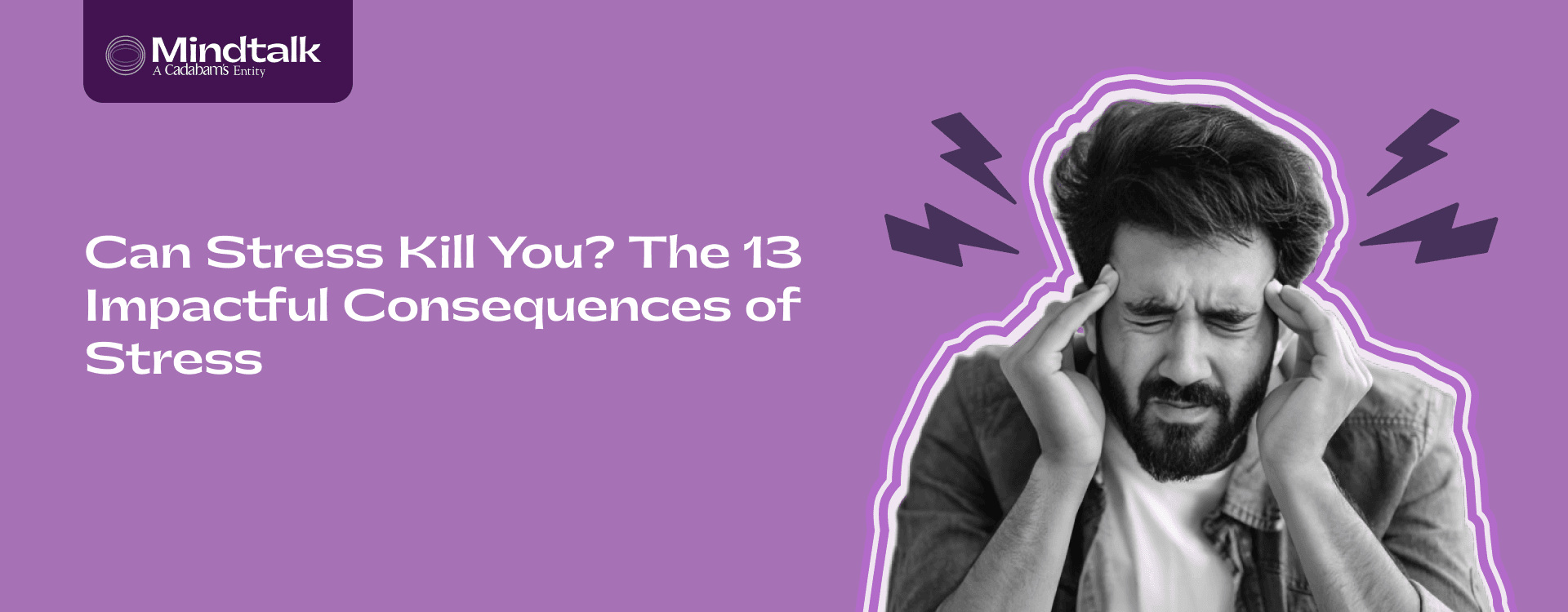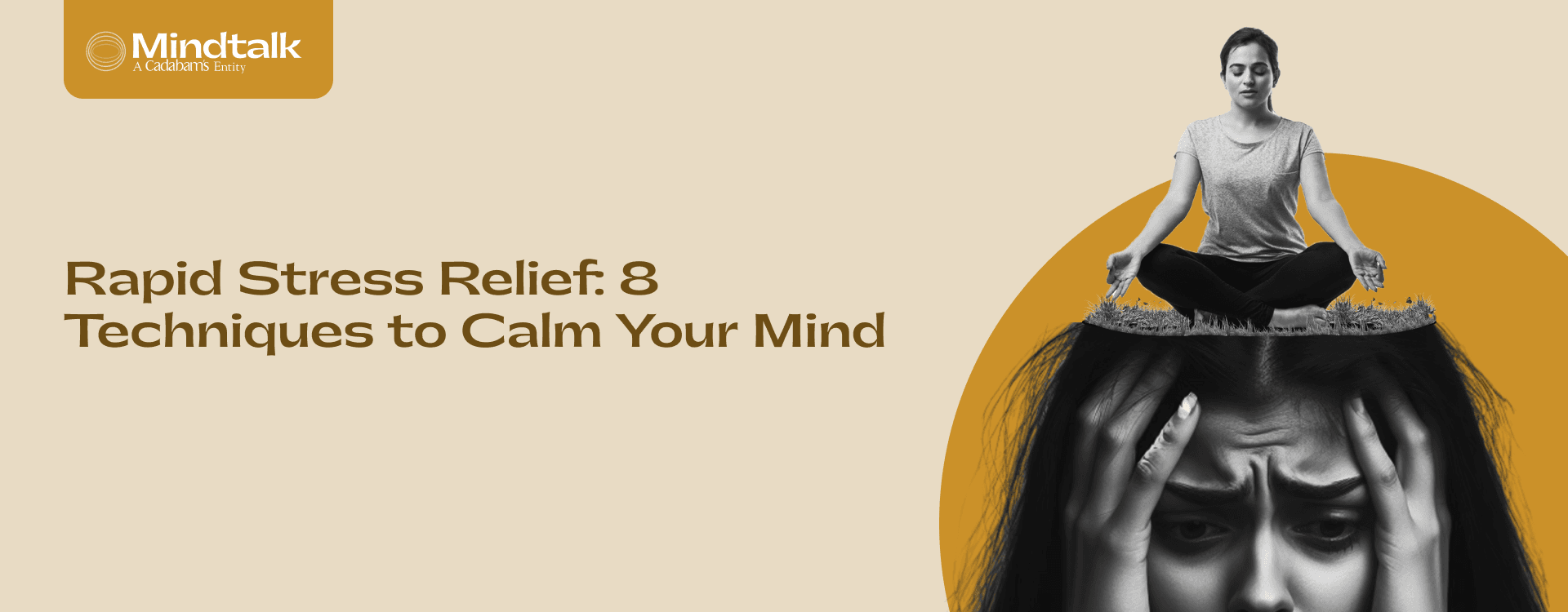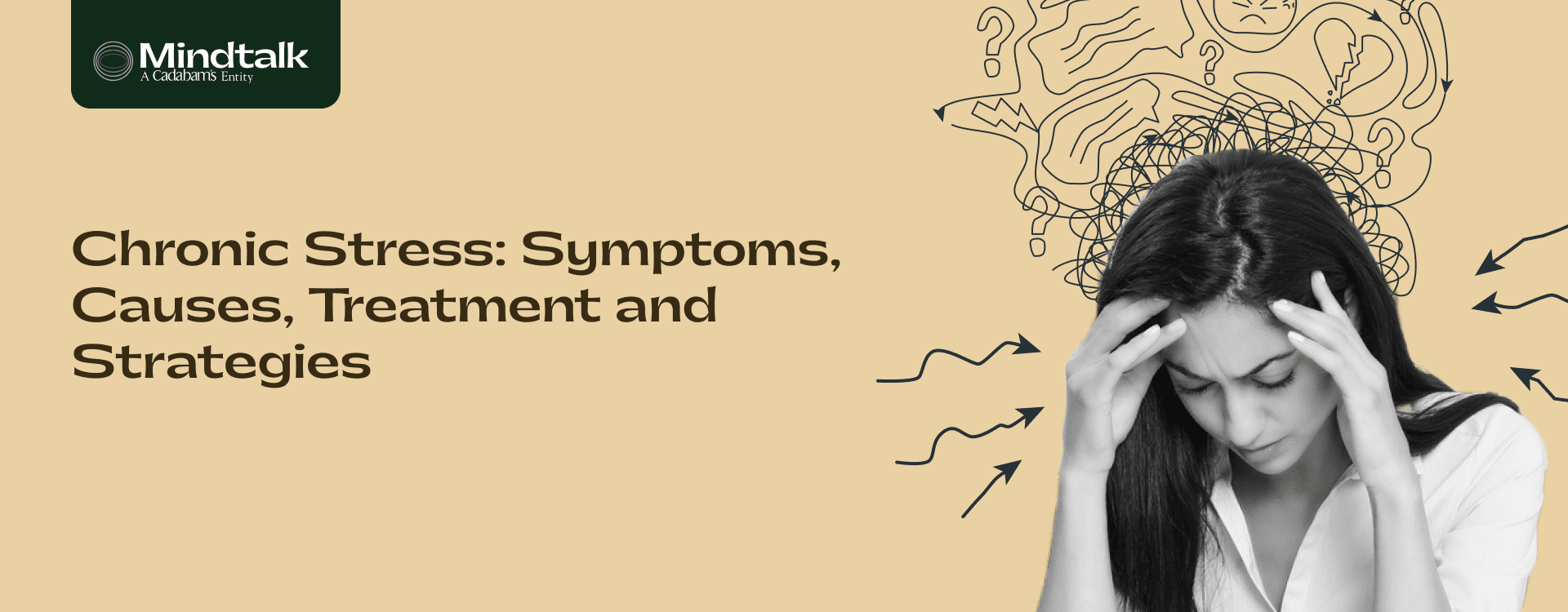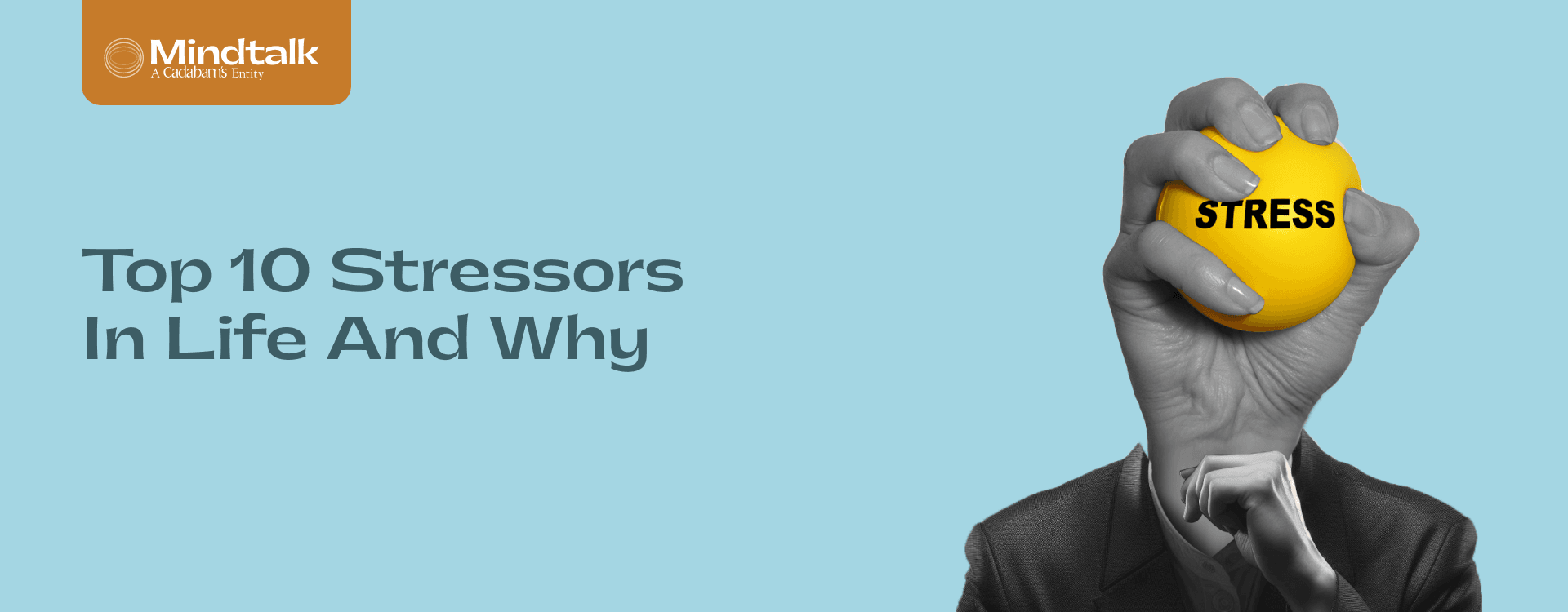The Long-Term Physical Effects Of Stress
We live in a busy world and go through a lot of things in our everyday lives. Sometimes, some of these events take a toll on our health and according to our personality traits, we react differently to these situations. We often use the word ‘stress’ to describe these unpleasant events, but did you know that there are mainly two types of stress?
Let’s learn about them and understand their long-term effects on us.
What Is Stress?
Let’s start by understanding what exactly stress is. Stress is our body’s natural reaction to situations that we consider dangerous, threatening, or challenging. When we experience these situations, we respond to them physically and emotionally, the response may vary from person to person.
There are mainly two types of stress, normal or acute stress, and long-term or chronic stress which is a lot more serious in nature.
Causes Of Long-Term Stress
Concerns, issues, or problems of ordinary affairs such as getting stuck in traffic, pending office work, or experiencing traumatic events can cause acute stress. However, these stresses are temporary and may last from 3 days to a month.
However, long-term stress is different and can impact you mentally and physically. There are multi-facet causes that can lead to long-term stress and some of the major ones are:-
Workplace And Academic Pressure
On average, we spend one-third of our life at work and academic places and the nature of the contemporary world is so demanding that sometimes it can cause a lot of pressure, leading to long-term stress. For example, at work heavy workloads, tight deadlines, lack of control over your work, job insecurity, competition, fear of failure, work-life imbalance, etc, can create work-related stress.
On the other hand, in academics, the pressure of scoring good grades, and comparison traps, may lead to sleep deprivation and social isolation which in turn may lead to chronic stress.
Relationship And Social Challenges
We, humans are social animals, we love to socialize and build relationships. These two aspects of our lives play a great role in our well-being. Thus, the absence of a social life and a stable relationship weakens our ability to cope with stress. This lack of connection leaves us feeling isolated and unsupported in the long run, which may lead to chronic stress.
Financial Uncertainties And Hardships
Money is a fundamental need that helps you afford basic things like food, housing, clothes, healthcare, etc. Devoid of financial security creates a constant state of worry, piling bills, unexpected expenses, and other hardships fuel stress levels and over time this may spiral into long-term stress.
How Does Stress Become Chronic?
Stress is our fight or flight response, designed especially for short-term challenges and situations. However, when one is constantly struggling with the aforementioned causes, our body doesn’t get enough time to relax and recover; unaware of effective coping strategies also aggravates the situation, resulting in chronic stress.
Physical Symptoms Of Prolonged Stress
When we are in a constant state of worry, it not only reflects on our mental well-being but is also visible on our bodies. Here are a few symptoms of stress.
Emotional Symptoms Of Long-term Stress
People respond to chronic stress differently. The emotional aspects of stress may be visible in the form of agitation, avoidance, inability to relax, and concentrate, low- self-esteem, etc.
Physical Symptoms Of Long-term Stress
Physical symptoms of long-term stress include constant headaches, low energy, stomach upset, insomnia, rapid heartbeat, clenching jaws, cold and sweaty hands, etc.
Cognitive Symptoms Of Long-Term Stress
Cognitive symptoms mean how long-term stress is affecting our brain’s ability to finish tasks, irrespective of the complexity of the task. Some of the symptoms include forgetfulness, rigid thinking, problems in concentration, poor judgment, etc.
Behavioral Symptoms Of Long-Term Stress
Stress also influences your behavior in negative ways. For example, a person with chronic stress may procrastinate responsibility, may indulge in substance abuse, and fidget. It also changes your appetite, either you start eating more or reduce the amount of food drastically.
How Does The Body Respond To Stress?
When we are in a state of stress our brain releases increased amounts of hormones like adrenaline and cortisol which make our heartbeat faster, increase our blood pressure, and boost our energy. Once the perceived threat is over, the hormone levels decrease to normal, and our body works as it should in normal conditions.
However, when we are under constant stress, our fight or flight response mode is always on, pumping stress hormones and disrupting the body’s natural processes, leading to a higher risk of developing other conditions, such as anxiety, depression, headaches, sleep problems, muscle tension, etc.
The Impact Of Chronic Stress On Well-being
Unlike acute stress and eustress (a type of stress that makes you excited and motivated), chronic stress affects our well-being in myriad ways. Here are some of the impacts of chronic stress on well-being.
Mental Health Consequences
Frequent exposure to stress hormones impacts the way our brain processes information which can significantly impact our mental health. It disrupts the delicate balance of chemicals in the brain, causing problems in regions like hippocampus, which plays a major role in memory and learning.
The Visceral Effects On Body Systems
In simple words, visceral effects refer to an impact we feel in our internal organs, mainly due to some external phenomenon, often a stress-related fight or flight response. The nervous system, respiratory system, cardiovascular system, immune system, etc., are some of the body systems affected by visceral effects.
What Are The Consequences Of Long-Term Stress?
Long-term stress or chronic stress affects our life in many ways. As already mentioned, stress can impact many aspects of our lives including physical and mental well-being. It is also one of the main reasons for chronic conditions like stroke, heart disease, and obesity. Though not directly, stress can also be responsible for diabetes. It also has ways to seep into your professional and personal life.
Strategies For Managing Long-Term Stress
In this modern era, stress is something that you can’t magically make disappear, however, there are ways you can manage long-term stress to a great extent. Here are a few strategies to manage chronic stress.
Exercise For Long-Term Stress
As far as our health is concerned, sedentary lives often invite trouble, and the simple solution is to get active. Exercise is a great way to control stress as it positively affects your mood. Walking, swimming, dancing, gym workouts, etc., can be great tools to combat stress.
Set Goals For Long-Term Stress
Thinking about the past and worrying about the future are considered some of the reasons that cause stress. To counter this feeling of constant worry, you can set goals for the day, week, or month. This will help you filter out distractions and focus on tangible objectives.
Talking To A Therapist Or Your Healthcare Provider
When you start feeling that your stress level is beyond your control and it is taking a toll on your life, it is time to talk to a therapist or healthcare provider. Therapists or mental health professionals can help you in various ways. Some of the benefits include identifying root causes, developing coping skills, building resilience, personalized treatment approaches, and offering a safe and confidential space.
Preventative Measures Against Chronic Stress
Throughout our days, weeks, months, and years, we go through a lot of situations, and many times some situations cause stress. We may not be able to control some of these circumstances, however, we can control the stress level with some preventive measures.
Building Resilience And Coping Skills
Changing your mindset and cultivating a positive outlook and focusing on things that you can control can create a sense of empowerment. Refraining from harmful and negative thoughts and converting these thoughts into positive ones, and by accepting challenges as part of life, you can learn, grow, and keep the stress at bay.
Other than these strategies you can also incorporate relaxing techniques like meditation, exercise, and mindfulness to sharpen your coping skills.
Importance Of Social Support And Healthy Relationships
Socialization is a part of human culture, and this is just for social status. It also helps in nurturing emotional bonds, boosting empathy, promotes a sense of belonging and connection within the community. These healthy relationships serve as a foundation for support and resilience and help us manage stress more effectively.
When To Consult A Doctor?
The first step towards consulting a doctor is to accept that you need help as this can make things much more easier for you to open up with your health expert. Now the question is when should you consult a doctor?
You should consult a doctor when you feel that stress is causing trouble in every aspect of your life, leading you towards substance abuse to cope with stress or when you start to think about self-harm.
Mindtalk On The Long-Term Physical Toll Of Stress
Stress is our body’s natural reaction, created to help us avoid difficult situations. It also has a form that motivates and inspires us to achieve great heights. However, if not managed properly it can control our lives and spiral out into grave concern. Fortunately, there are ways you can manage stress and stress-related problems effectively.
Through lifestyle changes and healthy habits, you can achieve great results. But if you are feeling overwhelmed and unable to cope with stress then professional help is just a call away.
One such place where you can get help is Mindtalk, where we offer a holistic approach to treat stress and related problems. From individual therapy to stress management to relaxation techniques, we provide comprehensive support tailored to your unique needs.
Common Stress-Related Health Problems
Stress can take a significant toll on physical health.
Prolonged or chronic stress affects multiple systems in the body, leading to stress-related health problems such as headaches, high blood pressure, heart disease, digestive issues, and lowered immunity.
The physiological impact of stress can worsen existing medical conditions if left unmanaged.
Recognising Chronic Stress Body Symptoms
Long-term stress often shows up as physical warning signs. Watch for these chronic stress body symptoms, which indicate how the body responds to chronic stress:
- Jaw clenching or teeth grinding
- Racing heartbeat or palpitations
- Fatigue and sleep disturbances
- Muscle tension or stiffness, especially in the neck and back
- Digestive problems like nausea, diarrhoea, or stomach cramps
The Link Between Stress and Immunity
Chronic stress weakens your body’s natural defence mechanisms. High levels of stress hormones reduce the activity of white blood cells, lowering the immune response and making you more susceptible to infections.
This stress and immunity link explains why people under prolonged stress often experience frequent colds, slow healing, or worsened chronic illnesses.
Understanding Cortisol and Stress Effects on Your Body
When stressed, your body releases cortisol and adrenaline as part of the nervous system response to stress. Short-term, this helps you cope, but chronic elevation causes harm:
- Cortisol spikes → disrupt metabolism and increase belly fat
- Adrenaline surges → raise blood pressure and strain the heart
- Long-term stress → leads to fatigue, hormonal imbalance, and reduced cognitive function
These cortisol and stress effects highlight why managing stress early is crucial.
Preventive Measures and Coping Mechanisms for Stress
You can reduce the physical effects of stress and prevent health problems with simple strategies:
- Breathing exercises or meditation to calm the nervous system
- Regular physical activity to release stress hormones
- Digital detox to reduce mental overload
- Spending time in nature to restore emotional balance
- Good sleep hygiene to repair and restore body functions
Practising these coping mechanisms for stress regularly helps protect long-term health.
Mental Health Professional For Stress



